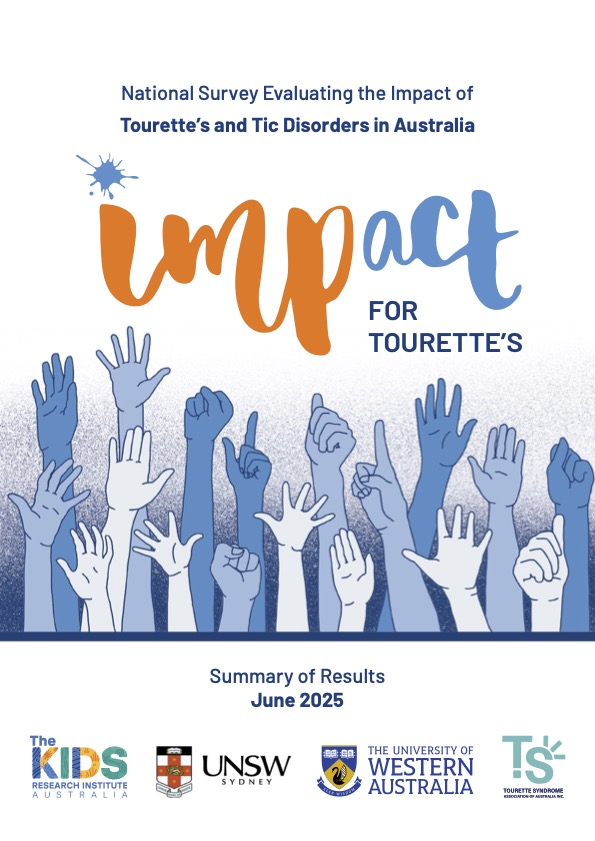Investigators
Dr Melissa Licari (Co-Lead), Prof Valsamma Eapen (Co-Lead), Matthew McQueen (Research Coordinator), Dr Amanda Maxwell, Prof Russell Dale, Prof Jenny Downs, Dr Gail Alvares, Mandy Maysey, Prof Andrew Whitehouse, Shannon Newman, Dr Alix Woolard, Dr Danielle Dowman, Dr Lisa Curtis-Wendlandt, Catherine Renison, Sandy Milne, Zoe Skoda.
What is Impact for Tourette's?
Impact for Tourette’s is the first survey of its kind in Australia, carefully designed to capture a comprehensive understanding of the difficulties faced by individuals living with tic disorders and their families. This national survey (based on N=206 individuals) examined the diagnostic journey, the daily functional challenges of living with tics, and the varied experiences with available treatments and therapies. We also sought to understand obstacles faced in education and employment, as well as accompanying financial strains. Finally, we examined the emotional and social struggles experienced by individuals and how these factors influence overall quality of life.
What did the Impact for Tourette’s report tell us?
People with tic disorders and their families face serious and widespread challenges in Australia. One in four people waited more than two years for a diagnosis. One-third were not offered any services or support after diagnosis. Only 40 per cent said their experience with treatment was positive. Most felt unsupported.
Over 80 per cent of people experience tics every day. Many said their tics cause pain and emotional distress. Two out of three people had been injured by their tics.
Three in four respondents had been bullied at school. Almost one in three were bullied by teachers. Most caregivers said that teachers had little understanding of tic conditions.
Almost half of children with tics showed signs of depression. Nearly half of caregivers said their child had expressed suicidal thoughts. One in ten children had attempted suicide. More than 70 per cent of adults had thought about ending their life. One in four adults had attempted suicide – five times higher than the national average. Most adults said their tics had a serious impact on their mental health. More than half of caregivers said their own mental health had been badly affected by the demands of caring.
Two out of five adults unable to work said their tics made it impossible to maintain employment. Many families are under financial pressure and feel shut out of the workforce.
These findings illustrate the significant clinical, psychological, educational, and socioeconomic impacts of tic disorders. The data reveal critical gaps in diagnosis, treatment, and support systems. Without targeted policy and healthcare responses, individuals with tic disorders will continue to face unnecessary suffering, impaired quality of life, and remain in the midst of a mental health crisis. Urgent, evidence-based action is required to address these unmet needs.

Download Impact for Tourette's - web version
Download Impact for Tourette's - summary
Suggested citation
Licari, M.K., Eapen, V., McQueen, M.C., and the Impact for Tourette’s Team. (2025). National Survey Evaluating the Impact of Tourette’s Syndrome and Tic Disorders in Australia: Summary of Results. The Kids Research Institute Australia, Perth, Western Australia.
External collaborators
The University of New South Wales, Tourette Syndrome Association of Australia, The University of Western Australia, The University of Sydney, Embrace.
